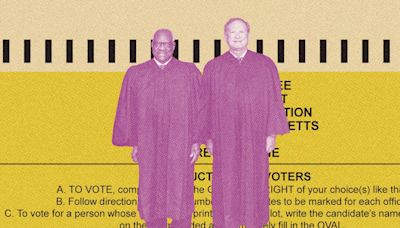Search results
May 15, 2024 · Earl Warren was an American jurist, the 14th chief justice (1953–69) of the United States who presided over the Supreme Court during a period of sweeping changes in U.S. constitutional law, especially in the areas of race relations, criminal procedure, and legislative apportionment.
- Early Life and Career
- Brown v. Board of Education
- Notable Decisions and Appointments
- Retirement and Death
- Sources
Born March 19, 1891, in Los Angeles to working-class Scandinavian immigrants (his father worked for Southern Pacific Railroad), Warren grew up in Bakersfield, California, working summer jobs in railroading. He attended the University of California, Berkeley, where he received both his undergraduate and law degrees, and began practicing private law ...
Warren resigned his position of governor and served nearly 16 years as chief justice from 1953-1969. But just two months into his term, he began hearing oral arguments in the historic Brown v. Board of Education case. Overruling 1896’s Plessy v. Ferguson “separate but equal” verdict, the landmark decision found the case violated the equal protectio...
Warren was appointed by President Lyndon Johnson to chair the John F. Kennedy assassination investigation, from 1963-1964, that became better known as the Warren Commission. The resulting controversial report found Lee Harvey Oswald was the lone gunman, although doubt and conspiracy theories continue to swirl around its validity. In addition to Bro...
Warren, who married Nina Palmquist Meyers in 1925, and had six children, retired from the Supreme Court in 1969. He died July 9, 1974, at the age of 83 and is buried at Arlington National Cemetery in Virginia. In 1981, he was posthumously awarded the Presidential Medal of Freedom, the nation’s highest honor for a civilian. “When history is written,...
“Earl Warren, 83, Who Led High Court In Time of Vast Social Change, Is Dead,” by Anthony Lewis, July 10, 1974, The New York Times. "Earl Warren, 1953-1969," Supreme Court Historical Society. “Governor Earl Warren,” National Governors Association. “History - Brown v. Board of Education Re-enactment,” United States Courts. “Brown v. Board of Educatio...
Dec 5, 2022 · How the Warren Court Expanded Civil Rights in America. As chief justice of the U.S. Supreme Court, Warren led a court that decided multiple historic rulings on civil rights cases. When...
- Nadra Kareem Nittle
- 2 min
Earl Warren was the 14th Chief Justice of the U.S. Supreme Court, succeeding Fred M. Vinson. Formerly the Governor of California, he was appointed by President Dwight D. Eisenhower during a recess of the Senate on October 2, 1953, and he was sworn into office on October 5, 1953.
Supreme Court Historical Society. Chief Justice Earl Warren. Historical profiles documenting the personal background, plus nomination and confirmation dates of previous chief justices of the U.S. Supreme Court: Earl Warren.
People also ask
Who was Earl Warren?
Why did Earl Warren write for the Supreme Court?
When did Warren become a Supreme Court Chief Justice?
What did Earl Warren do for a living?
Warren is generally considered to be one of the most influential Supreme Court justices and political leaders in the history of the United States . Warren was born in 1891 in Los Angeles and was raised in Bakersfield, California. After graduating from the University of California, Berkeley, School of Law, he began a legal career in Oakland.
Apr 2, 2014 · Famous Legal Figures. Civil Rights Activists. Earl Warren. Supreme Court Chief Justice Earl Warren was a former California governor who also headed the commission that investigated...


